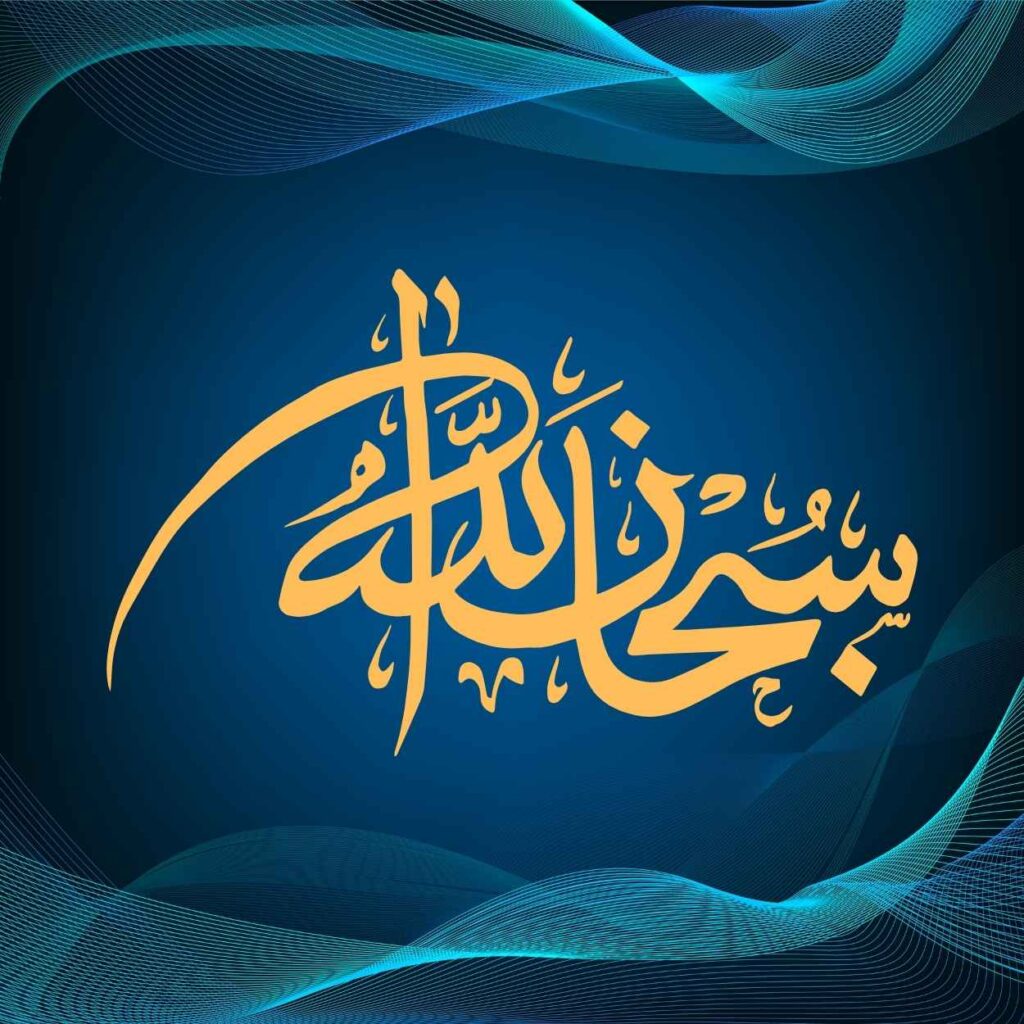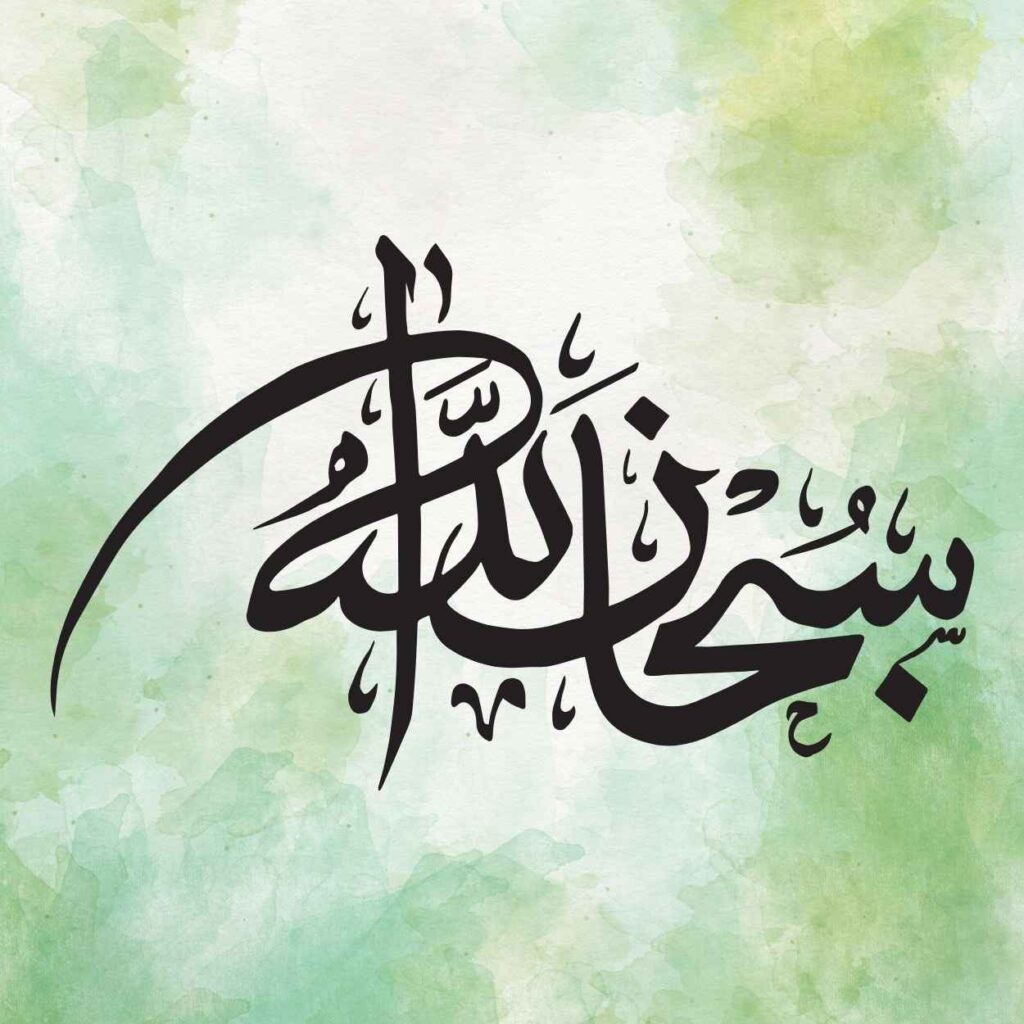SubhanAllah: The Incredible Power of سبحان الله in English and Arabic
Introduction
The phrase Subhan Allah—which means “Glory be to Allah”—is one of the simplest yet most powerful forms of dhikr (remembrance of Allah) in Islam. Through this expression, a believer acknowledges Allah’s perfection, free from any flaws or weaknesses. In various hadiths, the Prophet Muhammad (peace and blessings be upon him) emphasized the immense spiritual value of repeating Subhan Allah, highlighting its ability to fill the scales of good deeds, bring blessings, and earn the pleasure of Allah. This article delves into a collection of hadiths that focus specifically on the significance of Subhan Allah, showing how this single phrase, when uttered with sincerity, holds great weight in both this world and the Hereafter. Alongside other acts of worship, such as Alhamdulillah, La ilaha illallah, and Allahu Akbar, Subhan Allah forms the core of a believer’s connection to their Creator, elevating their faith and paving the way for spiritual success.
Dhikr Before Sleep: A Gift Greater than a Servant
َدَّثَنَا بَدَلُ بْنُ الْمُحَبَّرِ، أَخْبَرَنَا شُعْبَةُ، قَالَ: أَخْبَرَنِي الْحَكَمُ، قَالَ: سَمِعْتُ ابْنَ أَبِي لَيْلَى، حَدَّثَنَا عَلِيٌّ أَنَّ فَاطِمَةَ عَلَيْهَا السَّلَام اشْتَكَتْ مَا تَلْقَى مِنَ الرَّحَى مِمَّا تَطْحَنُ فَبَلَغَهَا أَنّ رَسُولَ اللَّهِ صَلَّى اللَّهُ عَلَيْهِ وَسَلَّمَ: أُتِيَ بِسَبْيٍ فَأَتَتْهُ تَسْأَلُهُ خَادِمًا فَلَمْ تُوَافِقْهُ فَذَكَرَتْ لِعَائِشَةَ فَجَاءَ النَّبِيُّ صَلَّى اللَّهُ عَلَيْهِ وَسَلَّمَ فَذَكَرَتْ ذَلِكَ عَائِشَةُ لَهُ فَأَتَانَا وَقَدْ دَخَلْنَا مَضَاجِعَنَا فَذَهَبْنَا لِنَقُومَ، فَقَالَ: “”عَلَى مَكَانِكُمَا حَتَّى وَجَدْتُ بَرْدَ قَدَمَيْهِ عَلَى صَدْرِي، فَقَالَ: أَلَا أَدُلُّكُمَا عَلَى خَيْرٍ مِمَّا سَأَلْتُمَاهُ إِذَا أَخَذْتُمَا مَضَاجِعَكُمَا فَكَبِّرَا اللَّهَ أَرْبَعًا وَثَلَاثِينَ، وَاحْمَدَا ثَلَاثًا وَثَلَاثِينَ، وَسَبِّحَا ثَلَاثًا وَثَلَاثِينَ، فَإِنَّ ذَلِكَ خَيْرٌ لَكُمَا مِمَّا سَأَلْتُمَاهُ
Narrated `Ali: Fatima complained of what she suffered from the hand mill and from grinding, when she got the news that some slave girls of the booty had been brought to Allah’s Apostle. She went to him to ask for a maid-servant, but she could not find him, and told `Aisha of her need. When the Prophet came, Aisha informed him of that. The Prophet came to our house when we had gone to our beds. (On seeing the Prophet) we were going to get up, but he said, ‘Keep at your places,’ I felt the coolness of the Prophet’s feet on my chest. Then he said, Shall I tell you a thing which is better than what you asked me for? When you go to your beds, say: ‘Allahu Akbar (i.e. Allah is Greater)’ for 34 times, and ‘Al hamdu Li llah (i.e. all the praises are for Allah)’ for 33 times, and Subhan Allah (i.e. Glorified be Allah) for 33 times. This is better for you than what you have requested.
Explanation:
This hadith narrates a story involving Fatimah (peace be upon her), the daughter of Prophet Muhammad (peace be upon him). The narration goes as follows:
Fatimah, who was experiencing difficulty from the physical strain of using a hand mill to grind grain, heard that the Prophet (peace be upon him) had received some captives. She approached him, requesting a servant to assist her. However, when she arrived, she was unable to meet him. Fatimah later mentioned her situation to Aisha (the wife of the Prophet). When the Prophet (peace be upon him) learned of this, he came to visit them, finding both Fatimah and Ali already resting in bed.
When they tried to get up to greet him, the Prophet said, “Stay where you are.” Then, as the narration describes, Ali felt the coolness of the Prophet’s feet on his chest as the Prophet approached. The Prophet (peace be upon him) offered them something better than what they had asked for: He advised them to recite the following when they go to bed:
- Say Allahu Akbar (Allah is the Greatest) 34 times,
- Say Alhamdulillah (Praise be to Allah) 33 times, and
- Say SubhanAllah (Glory be to Allah) 33 times.
He concluded by saying that this practice is better for them than receiving a servant.
This hadith emphasizes the spiritual strength and rewards that come from remembering Allah and engaging in dhikr (remembrance), which can bring more benefit and tranquility than physical assistance.
(Sahih al-Bukhari 5361, Sahih Muslim 2727)

Dhikr: A Path to Equal Spiritual Rewards for the Wealthy and the Poor
حَدَّثَنَا عَاصِمُ بْنُ النَّضْرِ التَّيْمِيُّ، حَدَّثَنَا الْمُعْتَمِرُ، حَدَّثَنَا عُبَيْدُ اللهِ، ح قَالَ: وَحَدَّثَنَا قُتَيْبَةُ بْنُ سَعِيدٍ، حَدَّثَنَا لَيْثٌ، عَنِ ابْنِ عَجْلَانَ، كِلَاهُمَا عَنْ سُمَيٍّ، عَنْ أَبِي صَالِحٍ، عَنْ أَبِي هُرَيْرَةَ – وَهَذَا حَدِيثُ قُتَيْبَةَ – أَنَّ فُقَرَاءَ الْمُهَاجِرِينَ أَتَوْا رَسُولَ اللهِ صَلَّى اللهُ عَلَيْهِ وَسَلَّمَ، فَقَالُوا: ذَهَبَ أَهْلُ الدُّثُورِ بِالدَّرَجَاتِ الْعُلَى، وَالنَّعِيمِ الْمُقِيمِ، فَقَالَ: «وَمَا ذَاكَ؟» قَالُوا: يُصَلُّونَ كَمَا نُصَلِّي، وَيَصُومُونَ كَمَا نَصُومُ، وَيَتَصَدَّقُونَ وَلَا نَتَصَدَّقُ، وَيُعْتِقُونَ وَلَا نُعْتِقُ، فَقَالَ رَسُولَ اللهِ صَلَّى اللهُ عَلَيْهِ وَسَلَّمَ: «أَفَلَا أُعَلِّمُكُمْ شَيْئًا تُدْرِكُونَ بِهِ مَنْ سَبَقَكُمْ وَتَسْبِقُونَ بِهِ مَنْ بَعْدَكُمْ؟ وَلَا يَكُونُ أَحَدٌ أَفْضَلَ مِنْكُمْ إِلَّا مَنْ صَنَعَ مِثْلَ مَا صَنَعْتُمْ» قَالُوا: بَلَى، يَا رَسُولُ اللهِ قَالَ: «تُسَبِّحُونَ، وَتُكَبِّرُونَ، وَتَحْمَدُونَ، دُبُرَ كُلِّ صَلَاةٍ ثَلَاثًا وَثَلَاثِينَ مَرَّةً» قَالَ أَبُو صَالِحٍ: فَرَجَعَ فُقَرَاءُ الْمُهَاجِرِينَ إِلَى رَسُولِ اللهِ صَلَّى اللهُ عَلَيْهِ وَسَلَّمَ، فَقَالُوا: سَمِعَ إِخْوَانُنَا أَهْلُ الْأَمْوَالِ بِمَا فَعَلْنَا، فَفَعَلُوا مِثْلَهُ، فَقَالَ رَسُولِ اللهِ صَلَّى اللهُ عَلَيْهِ وَسَلَّمَ: «ذَلِكَ فَضْلُ اللهِ يُؤْتِيهِ مَنْ يَشَاءُ» وَزَادَ غَيْرُ قُتَيْبَةَ فِي هَذَا الْحَدِيثِ عَنِ اللَّيْثِ، عَنِ ابْنِ عَجْلَانَ، قَالَ سُمَيٌّ: فَحَدَّثْتُ بَعْضَ أَهْلِي هَذَا الْحَدِيثَ، فَقَالَ: وَهِمْتَ، إِنَّمَا قَالَ «تُسَبِّحُ اللهَ ثَلَاثًا وَثَلَاثِينَ، وَتَحْمَدُ اللهَ ثَلَاثًا وَثَلَاثِينَ، وَتُكَبِّرُ اللهَ ثَلَاثًا وَثَلَاثِينَ» فَرَجَعْتُ إِلَى أَبِي صَالِحٍ فَقُلْتُ لَهُ ذَلِكَ، فَأَخَذَ بِيَدِي فَقَالَ: اللهُ أَكْبَرُ، وَسُبْحَانَ اللهِ، وَالْحَمْدُ لِلَّهِ، اللهُ أَكْبَرُ، وَسُبْحَانَ اللهِ، وَالْحَمْدُ لِلَّهِ، حَتَّى تَبْلُغَ مِنْ جَمِيعِهِنَّ ثَلَاثَةً وَثَلَاثِينَ. قَالَ ابْنُ عَجْلَانَ: فَحَدَّثْتُ بِهَذَا الْحَدِيثِ رَجَاءَ بْنَ حَيْوَةَ، فَحَدَّثَنِي بِمِثْلِهِ، عَنْ أَبِي صَالِحٍ، عَنْ أَبِي هُرَيْرَةَ، عَنْ رَسُولِ اللهِ صَلَّى اللهُ عَلَيْهِ وَسَلَّمَ
Abu Huraira reported:
The poor amongst the emigrants came to the Messenger of Allah ( صلی اللہ علیہ وسلم ) and said: The possessors of great wealth have obtained the highest ranks and the lasting bliss. He (the Holy Prophet) said: How is that? They said: They pray as we pray, and they observe fast as we observe fast, and they give charity but we do not give charity, and they set slaves free but we do not set slaves free. Upon this the Messenger of Allah ( صلی اللہ علیہ وسلم ) said: Shall I not teach you something by which you will catch upon those who have preceded you, and get ahead of those who come after you, only those who do as you do being more excellent than you? They said: Yes, Messenger of Allah. He (the Holy Prophet) said: Extol Allah, declare His Greatness, and Praise Him thirty-three times after every prayer. Abu Salih said: The poor amongst the emigrants returned to the Messenger of Allah (may peace upon him) saying: Our brethren, the possessors, of property have heard what we have done and they did the same. So the Messenger of Allah ( صلی اللہ علیہ وسلم ) said: This is Allah’s Grace which He gives to whom He wishes. Sumayy reported: I made a mention of this hadith to some members of my family (and one of them) said: You have forgotten; he (the Holy Prophet) had said (like this): Extol Allah thirty-three time, praise Allah thirty-three times and declare His Greatness thirty-three times. Ibn `Ajlan said: I made a mention of this hadith to Raja’ b. Haiwa and he narrated to me a hadith like this from Abu Salih from the Messenger of Allah ( صلی اللہ علیہ وسلم ) on the authority of Abu Huraira.
Explanation:
This hadith narrates an interaction between the poor among the Muhajireen (early Muslim emigrants from Mecca) and the Prophet Muhammad (peace be upon him). The poor approached the Prophet and expressed their concern, saying:
“The wealthy have taken all the higher ranks and lasting pleasures. They pray as we pray, fast as we fast, but they give in charity and free slaves while we cannot.”
The Prophet (peace be upon him) responded by teaching them a special form of dhikr (remembrance of Allah) that would allow them to catch up to and even surpass others in spiritual reward. He said:
“Shall I not teach you something by which you will catch up with those who have preceded you, and you will surpass those who come after you? And no one will be better than you except those who do the same as you.”
The Prophet then instructed them to say after every prayer:
- SubhanAllah (Glory be to Allah) 33 times,
- Alhamdulillah (Praise be to Allah) 33 times,
- Allahu Akbar (Allah is the Greatest) 33 times.
Later, the poor Muhajireen returned to the Prophet, saying that the wealthy had also started performing this dhikr. The Prophet (peace be upon him) responded, “That is the grace of Allah, which He gives to whom He wills.”
This hadith highlights the value of dhikr in earning spiritual rewards and the mercy of Allah in granting blessings to those who engage in His remembrance.
(Sahih Muslim 595)

Powerful Dhikr After Every Obligatory Prayer: A Path to Never-ending Rewards
وحَدَّثَنَا الْحَسَنُ بْنُ عِيسَى، أَخْبَرَنَا ابْنُ الْمُبَارَكِ، أَخْبَرَنَا مَالِكُ بْنُ مِغْوَلٍ، قَالَ: سَمِعْتُ الْحَكَمَ بْنَ عُتَيْبَةَ، يُحَدِّثُ عَنْ عَبْدِ الرَّحْمَنِ بْنِ أَبِي لَيْلَى، عَنْ كَعْبِ بْنِ عُجْرَةَ، عَنْ رَسُولِ اللهِ صَلَّى اللهُ عَلَيْهِ وَسَلَّمَ قَالَ: «مُعَقِّبَاتٌ لَا يَخِيبُ قَائِلُهُنَّ – أَوْ فَاعِلُهُنَّ – دُبُرَ كُلِّ صَلَاةٍ مَكْتُوبَةٍ، ثَلَاثٌ وَثَلَاثُونَ تَسْبِيحَةً، وَثَلَاثٌ وَثَلَاثُونَ تَحْمِيدَةً، وَأَرْبَعٌ وَثَلَاثُونَ تَكْبِيرَةً
Ka’b b. ‘Ujra reported Allah’s Messenger ( صلی اللہ علیہ وسلم ) as saying:
There are certain ejaculations, the repeaters of which or the performers of which after every prescribed prayer will never be caused disappointment: Glory be to Allah thirty-three times. Praise be to Allah thirty-three times, and Allah is most Great thirty-four times.
Explanation:
This hadith, narrated by Ka’b ibn ‘Ujrah, describes the virtues of performing a specific dhikr (remembrance of Allah) after each obligatory prayer. The Prophet Muhammad (peace be upon him) said:
“There are words of remembrance (Mu’aqqibat) that the one who says them or does them after every prescribed prayer will never be disappointed. They are:
- 33 times SubhanAllah (Glory be to Allah),
- 33 times Alhamdulillah (Praise be to Allah), and
- 34 times Allahu Akbar (Allah is the Greatest).”
This dhikr is highly recommended as a means of earning great rewards and blessings.
(Sahih Muslim 596)
Dhikr After Salah: A Formula for Forgiveness Even if Sins are as Vast as the Foam of the Sea
حَدَّثَنِي عَبْدُ الْحَمِيدِ بْنُ بَيَانٍ الْوَاسِطِيُّ، أَخْبَرَنَا خَالِدُ بْنُ عَبْدِ اللهِ، عَنْ سُهَيْلٍ، عَنْ أَبِي عُبَيْدٍ الْمَذْحِجِيِّ – قَالَ مُسْلِمٌ: أَبُو عُبَيْدٍ مَوْلَى سُلَيْمَانَ بْنِ عَبْدِ الْمَلِكِ – عَنْ عَطَاءِ بْنِ يَزِيدَ اللَّيْثِيِّ، عَنْ أَبِي هُرَيْرَةَ، عَنْ رَسُولِ اللهِ صَلَّى اللهُ عَلَيْهِ وَسَلَّمَ مَنْ سَبَّحَ اللهَ فِي دُبُرِ كُلِّ صَلَاةٍ ثَلَاثًا وَثَلَاثِينَ، وَحَمِدَ اللهَ ثَلَاثًا وَثَلَاثِينَ، وَكَبَّرَ اللهَ ثَلَاثًا وَثَلَاثِينَ، فَتْلِكَ تِسْعَةٌ وَتِسْعُونَ، وَقَالَ: تَمَامَ الْمِائَةِ: لَا إِلَهَ إِلَّا اللهُ وَحْدَهُ لَا شَرِيكَ لَهُ، لَهُ الْمُلْكُ وَلَهُ الْحَمْدُ وَهُوَ عَلَى كُلِّ شَيْءٍ قَدِيرٌ غُفِرَتْ خَطَايَاهُ وَإِنْ كَانَتْ مِثْلَ زَبَدِ الْبَحْرِ
Abu Huraira reported Allah’s Messenger ( صلی اللہ علیہ وسلم ) as saying:
If anyone extols Allah after every prayer thirty-three times, and praises Allah thirty-three times, and declares His Greatness thirty-three times, ninety-nine times in all, and says to complete a hundred: There is no god but Allah, having no partner with Him, to Him belongs sovereignty and to Him is praise due, and He is Potent over everything, his sins will be forgiven even If these are as abundant as the foam of the sea.
Explanation:
In this hadith, narrated by Abu Huraira, the Prophet Muhammad (peace be upon him) teaches a powerful way to seek forgiveness and earn immense rewards through dhikr (remembrance of Allah) after every obligatory prayer. He said:
“Whoever glorifies Allah by saying SubhanAllah 33 times, praises Him by saying Alhamdulillah 33 times, and magnifies Him by saying Allahu Akbar 33 times after each prayer — that totals 99. To complete 100, say: La ilaha illallah, wahdahu la sharika lah, lahu al-mulk wa lahu al-hamd, wa huwa ‘ala kulli shay’in qadeer (There is no god but Allah, alone, with no partner. His is the dominion and His is the praise, and He is able to do all things).”
The Prophet (peace be upon him) added that by doing this, one’s sins will be forgiven, even if they are as numerous as the foam of the sea.
(Sahih Muslim 597)

Every Good Deed is Charity
حَدَّثَنَا عَبْدُ اللَّهِ بْنُ مُحَمَّدِ بْنِ أَسْمَاءَ الضُّبَعِيُّ حَدَّثَنَا مَهْدِيُّ بْنُ مَيْمُونٍ حَدَّثَنَا وَاصِلٌ مَوْلَى أَبِي عُيَيْنَةَ عَنْ يَحْيَى بْنِ عُقَيْلٍ عَنْ يَحْيَى بْنِ يَعْمَرَ عَنْ أَبِي الْأَسْوَدِ الدِّيلِيِّ عَنْ أَبِي ذَرٍّ أَنَّ نَاسًا مِنْ أَصْحَابِ النَّبِيِّ صَلَّى اللَّهُ عَلَيْهِ وَسَلَّمَ قَالُوا لِلنَّبِيِّ صَلَّى اللَّهُ عَلَيْهِ وَسَلَّمَ يَا رَسُولَ اللَّهِ ذَهَبَ أَهْلُ الدُّثُورِ بِالْأُجُورِ يُصَلُّونَ كَمَا نُصَلِّي وَيَصُومُونَ كَمَا نَصُومُ وَيَتَصَدَّقُونَ بِفُضُولِ أَمْوَالِهِمْ قَالَ أَوَ لَيْسَ قَدْ جَعَلَ اللَّهُ لَكُمْ مَا تَصَّدَّقُونَ إِنَّ بِكُلِّ تَسْبِيحَةٍ صَدَقَةً وَكُلِّ تَكْبِيرَةٍ صَدَقَةً وَكُلِّ تَحْمِيدَةٍ صَدَقَةً وَكُلِّ تَهْلِيلَةٍ صَدَقَةً وَأَمْرٌ بِالْمَعْرُوفِ صَدَقَةٌ وَنَهْيٌ عَنْ مُنْكَرٍ صَدَقَةٌ وَفِي بُضْعِ أَحَدِكُمْ صَدَقَةٌ قَالُوا يَا رَسُولَ اللَّهِ أَيَأتِي أَحَدُنَا شَهْوَتَهُ وَيَكُونُ لَهُ فِيهَا أَجْرٌ قَالَ أَرَأَيْتُمْ لَوْ وَضَعَهَا فِي حَرَامٍ أَكَانَ عَلَيْهِ فِيهَا وِزْرٌ فَكَذَلِكَ إِذَا وَضَعَهَا فِي الْحَلَالِ كَانَ لَهُ أَجْرً
Abu Dharr reported:
some of the people from among the Companions of the Messenger of Allah ( صلی اللہ علیہ وسلم ) said to him: Messenger of Allah, the rich have taken away (all the) reward. They observe prayer as we do; they keep the fasts as we keep, and they give Sadaqa out of their surplus riches. Upon this he (the Holy Prophet) said: Has Allah not prescribed for you (a course) by following which you can (also) do sadaqa? In every declaration of the glorification of Allah (i. e. saying Subhan Allah) there is a Sadaqa, and every Takbir (i. e. saying Allah-O-Akbar) is a sadaqa, and every praise of His (saying al-Hamdu Lillah) is a Sadaqa and every declaration that He is One (La illha ill-Allah) is a sadaqa, and enjoining of good is a sadaqa, and forbidding of that which is evil is a Sadaqa, and in man’s sexual Intercourse (with his wife, ) there is a Sadaqa. They (the Companions) said: Messenger of Allah, is there reward for him who satisfies his sexual passion among us? He said: Tell me, if he were to devote it to something forbidden, would it not be a sin on his part? Similarly, if he were to devote it to something lawful, he should have a reward.
Explanation:
In this hadith, narrated by Abu Dharr, some companions of the Prophet Muhammad (peace be upon him) expressed their concern that the wealthy people were gaining more rewards because they could give in charity. The Prophet (peace be upon him) responded by saying that Allah has made many ways to earn rewards and give charity even without wealth. He explained that saying SubhanAllah (Glorifying Allah), Allahu Akbar (Magnifying Allah), Alhamdulillah (Praising Allah), and La ilaha illallah (Declaring the Oneness of Allah) are all forms of charity. Additionally, doing good deeds like enjoining what is right, forbidding what is wrong, and even fulfilling one’s desires in a lawful manner can also earn rewards, as long as it is done within halal boundaries.
(Sahih Muslim 1006)
The Simple Acts Leading to Paradise
حَدَّثَنَا أَحْمَدُ بْنُ مَنِيعٍ، حَدَّثَنَا إِسْمَاعِيل ابْنُ عُلَيَّةَ، حَدَّثَنَا عَطَاءُ بْنُ السَّائِبِ، عَنْ أَبِيهِ، عَنْ عَبْدِ اللَّهِ بْنِ عَمْرٍو رَضِيَ اللَّهُ عَنْهُمَا، قَالَ: قَالَ رَسُولُ اللَّهِ صَلَّى اللَّهُ عَلَيْهِ وَسَلَّمَ: خَلَّتَانِ لَا يُحْصِيهِمَا رَجُلٌ مُسْلِمٌ إِلَّا دَخَلَ الْجَنَّةَ أَلَا وَهُمَا يَسِيرٌ، وَمَنْ يَعْمَلُ بِهِمَا قَلِيلٌ: يُسَبِّحُ اللَّهَ فِي دُبُرِ كُلِّ صَلَاةٍ عَشْرًا، وَيَحْمَدُهُ عَشْرًا، وَيُكَبِّرُهُ عَشْرًا ، قَالَ: فَأَنَا رَأَيْتُ رَسُولَ اللَّهِ صَلَّى اللَّهُ عَلَيْهِ وَسَلَّمَ يَعْقِدُهَا بِيَدِهِ، قَالَ: فَتِلْكَ خَمْسُونَ وَمِائَةٌ بِاللِّسَانِ وَأَلْفٌ وَخَمْسُ مِائَةٍ فِي الْمِيزَانِ، وَإِذَا أَخَذْتَ مَضْجَعَكَ تُسَبِّحُهُ وَتُكَبِّرُهُ وَتَحْمَدُهُ مِائَةً، فَتِلْكَ مِائَةٌ بِاللِّسَانِ وَأَلْفٌ فِي الْمِيزَانِ، فَأَيُّكُمْ يَعْمَلُ فِي الْيَوْمِ وَاللَّيْلَةِ أَلْفَيْنِ وَخَمْسَ مِائَةِ سَيِّئَةٍ ، قَالُوا: فَكَيْفَ لَا يُحْصِيهَا ؟ قَالَ: يَأْتِي أَحَدَكُمُ الشَّيْطَانُ وَهُوَ فِي صَلَاتِهِ، فَيَقُولُ: اذْكُرْ كَذَا اذْكُرْ كَذَا حَتَّى يَنْفَتِلَ، فَلَعَلَّهُ لَا أَنْ يَفْعَلُ، وَيَأْتِيهِ وَهُوَ فِي مَضْجَعِهِ فَلَا يَزَالُ يُنَوِّمُهُ حَتَّى يَنَامَ . قَالَ أَبُو عِيسَى: هَذَا حَدِيثٌ حَسَنٌ صَحِيحٌ، وَقَدْ رَوَى شُعْبَةُ، وَالثَّوْرِيُّ، عَنْ عَطَاءِ بْنِ السَّائِبِ هَذَا الْحَدِيثَ، وَرَوَى الْأَعْمَشُ هَذَا الْحَدِيثَ عَنْ عَطَاءِ بْنِ السَّائِبِ مُخْتَصَرًا، وَفِي الْبَابِ، عَنْ زَيْدِ بْنِ ثَابِتٍ، وَأَنَسٍ، وَابْنِ عَبَّاسٍ رَضِيَ اللهُ عَنْهُ
Abdullah bin `Amr [may Allah be pleased with both of them] said:
“The Messenger of Allah said: ‘There are two characteristics over which a Muslim man does not guard, except that he enters Paradise. And indeed, they are easy, and those who act upon them are few: He glorifies Allah at the end of every prayer ten times (saying Subḥān Allāh) and praises Him ten times saying (Al-Ḥamdulillāh) and extols His greatness ten times (saying Allāhu Akbar).’”He said: “And I have seen the Messenger of Allah counting them with his hand. He said: ‘So this is one hundred and fifty with the tongue, and one thousand and five hundred on the Scale. When you go to bed, you glorify Him, extol His greatness, and praise Him a hundred times, so this is one hundred with the tongue and one thousand on the Scale. Which of you perform two thousand and five hundred evil deeds in a single day and night?’ They said: ‘How could we not guard over them?’ He said: ‘Shaitan comes to one of you when he is in his Salat and says: “Remember such and such, remember such and such” until he turns perhaps he will not do it. And he comes to him and he is lying down and makes him sleepy until he falls asleep.’”
Explanation:
This hadith, narrated by Abdullah ibn Amr, emphasizes two simple yet powerful acts of worship that, when consistently practiced by a Muslim, will guarantee entry into Paradise. The Prophet Muhammad (peace be upon him) highlighted the importance of glorifying Allah (making tasbih), praising Him (making tahmid), and magnifying Him (making takbir) after each prayer. Specifically, he recommended saying “Subhan Allah” (Glory be to Allah) ten times, “Alhamdulillah” (All praise is due to Allah) ten times, and “Allahu Akbar” (Allah is the Greatest) ten times, which collectively amount to 150 acts of worship when recited with the tongue, but are valued at 1,000 good deeds in the balance on the Day of Judgment.
Furthermore, the hadith stresses the importance of continuing this remembrance of Allah when preparing for sleep by saying these phrases a hundred times, reinforcing the idea that consistent remembrance can outweigh a multitude of sins. The Prophet (peace be upon him) warns that the devil may distract one during prayer and while preparing for sleep, preventing them from focusing on their worship. The hadith concludes by affirming its authenticity and mentions other narrators who have related similar teachings.
(Jami` at-Tirmidhi 3477)

The Importance of Dhikr (Remembrance of Allah) After Prayers
حَدَّثَنَا مُحَمَّدُ بْنُ إِسْمَاعِيل بْنِ سَمُرَةَ الْأَحْمَسِيُّ الْكُوفِيُّ، حَدَّثَنَا أَسْبَاطُ بْنُ مُحَمَّدٍ، حَدَّثَنَا عَمْرُو بْنُ قَيْسٍ الْمُلَائِيُّ، عَنِ الْحَكَمِ بْنِ عُتَيْبَةَ، عَنْ عَبْدِ الرَّحْمَنِ بْنِ أَبِي لَيْلَى، عَنْ كَعْبِ بْنِ عُجْرَةَ، عَنِ النَّبِيِّ صَلَّى اللَّهُ عَلَيْهِ وَسَلَّمَ، قَالَ: مُعَقِّبَاتٌ لَا يَخِيبُ قَائِلُهُنَّ: يُسَبِّحُ اللَّهَ فِي دُبُرِ كُلِّ صَلَاةٍ ثَلَاثًا وَثَلَاثِينَ، وَيَحْمَدُهُ ثَلَاثًا وَثَلَاثِينَ، وَيُكَبِّرُهُ أَرْبَعًا وَثَلَاثِينَ . قَالَ أَبُو عِيسَى: هَذَا حَدِيثٌ حَسَنٌ، وَعَمْرُو بْنُ قَيْسٍ الْمُلَائِيُّ ثِقَةٌ حَافِظٌ، وَرَوَى شُعْبَةُ هَذَا الْحَدِيثَ عَنِ الْحَكَمِ، وَلَمْ يَرْفَعْهُ، وَرَوَاهُ مَنْصُورُ بْنُ الْمُعْتَمِرِ، عَنِ الْحَكَمِ فَرَفَعَهُ
Ka’b bin Ujrah narrated that:
The Prophet said: “There are Mu’aqqibat, he who says them shall not be miserable. Glorify Allah at the end of every prayer thirty-three times, and praise him thirty-three times, and extol His greatness thirty-four times.”
Explanation
This hadith highlights the significance of engaging in dhikr (remembrance of Allah) after each obligatory prayer. The Prophet Muhammad (peace be upon him) emphasizes specific phrases to recite after prayer:
- Subhanallah (سبحان الله) – “Glory be to Allah” (33 times)
- Alhamdulillah (الحمد لله) – “All praise is due to Allah” (33 times)
- Allahu Akbar (الله أكبر) – “Allah is the Greatest” (34 times)
Reciting these phrases serves as a means to purify oneself and seek forgiveness from Allah. The Prophet also assures that those who consistently engage in this practice will not be disappointed in their supplications, underscoring the spiritual benefits and rewards associated with regular remembrance of Allah.
(Jami` at-Tirmidhi 3478)
The Recommended Dhikr After Prayer and the Addition of Tahleel
حَدَّثَنَا يَحْيَى بْنُ خَلَفٍ، حَدَّثَنَا ابْنُ أَبِي عَدِيٍّ، عَنْ هِشَامِ بْنِ حَسَّانَ، عَنْ مُحَمَّدِ بْنِ سِيرِينَ، عَنْ كَثِيرِ بْنِ أَفْلَحَ، عَنْ زَيْدِ بْنِ ثَابِتٍ رَضِيَ اللَّهُ عَنْهُ، قَالَ: أُمِرْنَا أَنْ نُسَبِّحَ دُبُرَ كُلِّ صَلَاةٍ ثَلَاثًا وَثَلَاثِينَ، وَنَحْمَدَهُ ثَلَاثًا وَثَلَاثِينَ، وَنُكَبِّرَهُ أَرْبَعًا وَثَلَاثِينَ، قَالَ: فَرَأَى رَجُلٌ مِنَ الْأَنْصَارِ فِي الْمَنَامِ، فَقَالَ: أَمَرَكُمْ رَسُولُ اللَّهِ صَلَّى اللَّهُ عَلَيْهِ وَسَلَّمَ أَنْ تُسَبِّحُوا فِي دُبُرِ كُلِّ صَلَاةٍ ثَلَاثًا وَثَلَاثِينَ، وَتَحْمَدُوا اللَّهَ ثَلَاثًا وَثَلَاثِينَ، وَتُكَبِّرُوا أَرْبَعًا وَثَلَاثِينَ ، قَالَ: نَعَمْ، قَالَ: فَاجْعَلُوا خَمْسًا وَعِشْرِينَ، وَاجْعَلُوا التَّهْلِيلَ مَعَهُنَّ، فَغَدَا عَلَى النَّبِيِّ صَلَّى اللَّهُ عَلَيْهِ وَسَلَّمَ فَحَدَّثَهُ، فَقَالَ: افْعَلُوا . قَالَ أَبُو عِيسَى: هَذَا حَدِيثٌ حَسَنٌ صَحِيحٌ
Zaid bin Thabit (ra) said:
“We were ordered to say the Tasbīḥ at the end of every Salat thirty-three times, and to say the Takbīr thirty-four times.” He said: “Then a man from the Ansar had a dream in which someone said: ‘The Messenger of Allah (ﷺ) ordered you to say the Tasbīḥ at the end of every Salat thirty-three times, and to say the Taḥmīd thirty-three times, and to say the Takbīr thirty-four times?’ He said: ‘Yes.’ He said: ‘Then make them twenty-five and add the Tahlīl (saying Lā ilāha illallāh) to them.’ The next day he went to the Prophet (ﷺ) and informed him, so he said: “Do it.”
Explanation
This hadith instructs Muslims on the practice of engaging in dhikr (remembrance of Allah) after each obligatory prayer. The specific phrases to be recited are:
- Subhanallah (سبحان الله) – “Glory be to Allah” (33 times)
- Alhamdulillah (الحمد لله) – “All praise is due to Allah” (33 times)
- Allahu Akbar (الله أكبر) – “Allah is the Greatest” (34 times)
A man from the Ansar (the early supporters of the Prophet) saw in a dream that the Prophet Muhammad (peace be upon him) encouraged them to add the recitation of La ilaha illallah (لا إله إلا الله) – “There is no god but Allah” to their dhikr. When he reported this vision to the Prophet, he confirmed that they should implement this practice.
This hadith emphasizes the importance of dhikr after prayer and the flexibility to enhance it with the phrase of Tahleel (the declaration of faith), which reinforces the concept of monotheism in Islam.
(Jami` at-Tirmidhi 3479)

The Easiest Way to Earn a Thousand Good Deeds
حَدَّثَنَا مُحَمَّدُ بْنُ بَشَّارٍ، حَدَّثَنَا يَحْيَى بْنُ سَعِيدٍ، حَدَّثَنَا مُوسَى الْجُهَنِيُّ، حَدَّثَنِي مُصْعَبُ بْنُ سَعْدٍ، عَنْ أَبِيهِ، أَنّ رَسُولَ اللَّهِ صَلَّى اللَّهُ عَلَيْهِ وَسَلَّمَ قَالَ لِجُلَسَائِهِ: أَيَعْجِزُ أَحَدُكُمْ أَنْ يَكْسِبَ أَلْفَ حَسَنَةٍ ؟ فَسَأَلَهُ سَائِلٌ مِنْ جُلَسَائِهِ: كَيْفَ يَكْسِبُ أَحَدُنَا أَلْفَ حَسَنَةٍ ؟ قَالَ: يُسَبِّحُ أَحَدُكُمْ مِائَةَ تَسْبِيحَةٍ تُكْتَبُ لَهُ أَلْفُ حَسَنَةٍ وَتُحَطُّ عَنْهُ أَلْفُ سَيِّئَةٍ . قَالَ أَبُو عِيسَى: هَذَا حَدِيثٌ حَسَنٌ صَحِيحٌ
Mus`ab bin Sa`d narrated from his father, that :
the Messenger of Allah (ﷺ) said to those sitting with him: “Is one of you incapable of attaining a thousand good deeds?” So a questioner among those seated with him asked him: “How can one of us earn a thousand good deeds?” He said: “(When) one of you recites a hundred Tasbīḥāt a thousand good deeds are written for him, and a thousand evil deeds are wiped away from him.”
Explanation
In this hadith, the Prophet Muhammad (peace be upon him) encourages his companions to engage in acts of worship that are easy to perform yet immensely rewarding. He asks them if any of them would find it difficult to earn a thousand good deeds. When questioned about how this could be achieved, he explains that simply reciting Subhanallah (سبحان الله)—meaning “Glory be to Allah”—one hundred times can lead to the earning of a thousand good deeds. Furthermore, for each utterance, a thousand bad deeds are erased.
This hadith emphasizes the significance of dhikr (remembrance of Allah) and illustrates that sincere acts of worship, even if they seem simple, can lead to substantial rewards and forgiveness of sins.
(Jami` at-Tirmidhi 3513)
The Superiority of Dhikr in Ramadan
حَدَّثَنَا الْحُسَيْنُ بْنُ الأَسْوَدِ الْعِجْلِيُّ الْبَغْدَادِيُّ، حَدَّثَنَا يَحْيَى بْنُ آدَمَ، عَنِ الْحَسَنِ بْنِ صَالِحٍ، عَنْ أَبِي بِشْرٍ، عَنِ الزُّهْرِيِّ قَالَ: تَسْبِيحَةٌ فِي رَمَضَانَ أَفْضَلُ مِنْ أَلْفِ تَسْبِيحَةٍ فِي غَيْرِهِ
Az-Zuhri said:
“A Tasbihah in Ramadan is better than a thousand Tasbihah in other that it.”
Explanation
This hadith conveys the profound virtue of engaging in dhikr (remembrance of Allah) during the holy month of Ramadan. According to the narration by Al-Zuhri, a single act of tasbih (saying “Subhanallah” or similar phrases glorifying Allah) in Ramadan is more rewarding than a thousand acts of tasbih performed during other months. This highlights the special significance and increased rewards for acts of worship during Ramadan, emphasizing that this month is a time of heightened spirituality and devotion.
(Jami` at-Tirmidhi 3472)

The Significance of Tasbih, Hamd, and Tawhid in Islam
حَدَّثَنَا الْحَسَنُ بْنُ عَرَفَةَ، حَدَّثَنَا إِسْمَاعِيل بْنُ عَيَّاشٍ، عَنْ عَبْدِ الرَّحْمَنِ بْنِ زِيَادِ بْنِ أَنْعُمٍ، عَنْ عَبْدِ اللَّهِ بْنِ يَزِيدَ، عَنْ عَبْدِ اللَّهِ بْنِ عَمْرٍو، قَالَ: قَالَ رَسُولُ اللَّهِ صَلَّى اللَّهُ عَلَيْهِ وَسَلَّمَ: التَّسْبِيحُ نِصْفُ الْمِيزَانِ، وَالْحَمْدُ لِلَّهِ يَمْلَؤُهُ، وَلَا إِلَهَ إِلَّا اللَّهُ لَيْسَ لَهَا دُونَ اللَّهِ حِجَابٌ حَتَّى تَخْلُصَ إِلَيْهِ . قَالَ أَبُو عِيسَى: هَذَا حَدِيثٌ غَرِيبٌ مِنْ هَذَا الْوَجْهِ وَلَيْسَ إِسْنَادُهُ بِالْقَوِيِّ، وَعَبْدُ الرَّحْمَنِ بْنُ زِيَادِ بْنِ أَنْعُمٍ هُوَ الإِفْرِيقِيُّ، وَقَدْ ضَعَّفَهُ أَحْمَدُ بْنُ حَنْبَلٍ، وَيَحْيَى بْنُ مَعِينٍ، وَعَبْدُ اللهِ بْنُ يَزِيدَ هُوَ أَبُو عَبْدِ الرَّحْمَنِ الْحُبُلِيُّ
Abdullah bin Amr narrated that the Messenger of Allah said:
“At-Tasbīḥ is half of the Scale, and All praise is due to Allah (Al-Ḥamdulillāh)’ fills it, and (as for) None has the right to be worshipped but Allah (Lā Ilāha Illallāh)’ – there is no barrier to it from Allah until it reaches Him.”
Explanation
In this hadith, the Prophet Muhammad (peace be upon him) emphasizes the importance and value of specific forms of dhikr (remembrance of Allah). He states that:
- Tasbih (glorification of Allah) is considered half of the scale of good deeds.
- Hamd (praising Allah) fills the scale entirely.
- Tawhid (the declaration of the oneness of Allah, expressed as “There is no deity but Allah”) has no barrier preventing it from reaching Allah, signifying its profound significance and direct connection to Allah.
This narration highlights the spiritual weight and reward associated with these forms of worship, encouraging believers to engage in them regularly.
(Jami` at-Tirmidhi 3518)
The Supplication for Travel and the Importance of Dhikr While Traveling
حَدَّثَنَا الْحَسَنُ بْنُ عَلِيٍّ، حَدَّثَنَا عَبْدُ الرَّزَّاقِ، أَخْبَرَنَا ابْنُ جُرَيْجٍ، أَخْبَرَنِي أَبُو الزُّبَيْرِ، أَنَّ عَلِيًّا الأَزَدِيَّ، أَخْبَرَهُ أَنَّ ابْنَ عُمَرَ عَلَّمَهُ، أَنَّ رَسُولَ اللَّهِ صَلَّى اللَّهُ عَلَيْهِ وَسَلَّمَ: كَانَ إِذَا اسْتَوَى عَلَى بِعِيرِهِ خَارِجًا إِلَى سَفَرٍ كَبَّرَ ثَلَاثًا ثُمَّ قَالَ: سُبْحَانَ الَّذِي سَخَّرَ لَنَا هَذَا وَمَا كُنَّا لَهُ مُقْرِنِينَ 13 وَإِنَّا إِلَى رَبِّنَا لَمُنْقَلِبُونَ 14 سورة الزخرف آية 13-14، اللَّهُمَّ إِنِّي أَسْأَلُكَ فِي سَفَرِنَا هَذَا الْبِرَّ وَالتَّقْوَى وَمِنَ الْعَمَلِ مَا تَرْضَى، اللَّهُمَّ هَوِّنْ عَلَيْنَا سَفَرَنَا هَذَا، اللَّهُمَّ اطْوِ لَنَا الْبُعْدَ، اللَّهُمَّ أَنْتَ الصَّاحِبُ فِي السَّفَرِ وَالْخَلِيفَةُ فِي الْأَهْلِ وَالْمَالِ، وَإِذَا رَجَعَ قَالَهُنَّ وَزَادَ فِيهِنَّ آيِبُونَ تَائِبُونَ عَابِدُونَ لِرَبِّنَا حَامِدُونَ، وَكَانَ النَّبِيُّ صَلَّى اللَّهُ عَلَيْهِ وَسَلَّمَ وَجُيُوشُهُ إِذَا عَلَوْا الثَّنَايَا كَبَّرُوا وَإِذَا هَبَطُوا سَبَّحُوا فَوُضِعَتِ الصَّلَاةُ عَلَى ذَلِكَ
Narrated Abdullah ibn Umar: When the Messenger of Allah صلی اللہ علیہ وسلم sat on his camel to go out on a journey, he said: Allah is Most Great three times. Then he said: Glory be to Him Who has made subservient to us, for we had not the strength for it, and to our Lord do we return. O Allah, we ask Thee in this journey of ours, uprightness, piety and such deeds as are pleasing to Thee. O Allah, make easy for us this journey of ours and make its length short for us. O Allah, Thou art the Companion in the journey, and the One Who looks after the family and property in our absence. When he returned, he said these words adding: Returning, repentant, serving and praising our Lord. The Prophet صلی اللہ علیہ وسلم and his armies said: Allah is Most Great when they went up to high ground; and when armies said: Allah is most Great when they went up to high ground; and when they descended, they said: Glory be to Allah. So the prayer was patterned on that.
Explanation
In this hadith, the Prophet Muhammad (peace be upon him) is described as performing specific acts of dhikr (remembrance of Allah) when preparing for travel. The hadith details:
- Takbir (Saying “Allahu Akbar”): The Prophet would say “Allahu Akbar” three times before embarking on a journey.
- Tasbih and Ayat Recitation: He recited the following verses from Surah Az-Zukhruf (43:13-14):
- “Glory be to Him who has subjected this to us, and we could not have done it by ourselves. And verily, to our Lord we shall return.”
- Supplications: The Prophet would make supplications asking Allah for righteousness, piety, and favorable conditions for travel. He would also pray for ease in the journey and safe return.
- Return Supplication: Upon returning, he would repeat these supplications but add the phrase “آئبون تائبون عابدون لربنا حامدون” (Returning, repentant, worshipping our Lord, and praising Him).
Additionally, it is noted that when the Prophet and his companions would ascend a hill or incline, they would say “Allahu Akbar,” and when descending, they would say “SubhanAllah.” This practice highlights the importance of remembering Allah during both the journey and in everyday actions.
(Jami at-Tirmidhi 3440)

The Virtue of Dhikr and Supplications from the Prophet Muhammad (peace be upon him)
أَخْبَرَنَا مُحَمَّدُ بْنُ بَشَّارٍ، قَالَ: حَدَّثَنَا مُحَمَّدٌ، قَالَ: حَدَّثَنَا شُعْبَةُ، عَنْ مُحَمَّدِ بْنِ عَبْدِ الرَّحْمَنِ مَوْلَى آلِ طَلْحَةَ، قَالَ: سَمِعْتُ كُرَيْبًا، عَنِ ابْنِ عَبَّاسٍ، عَنْ جُوَيْرِيَةَ بِنْتِ الْحَارِثِ، أَنّ النَّبِيَّ صَلَّى اللَّهُ عَلَيْهِ وَسَلَّمَ مَرَّ عَلَيْهَا وَهِيَ فِي الْمَسْجِدِ تَدْعُو، ثُمَّ مَرَّ بِهَا قَرِيبًا مِنْ نِصْفِ النَّهَارِ، فَقَالَ لَهَا: مَا زِلْتِ عَلَى حَالِكِ ، قَالَتْ: نَعَمْ، قَالَ: أَلَا أُعَلِّمُكِ يَعْنِي كَلِمَاتٍ تَقُولِينَهُنَّ: سُبْحَانَ اللَّهِ عَدَدَ خَلْقِهِ، سُبْحَانَ اللَّهِ عَدَدَ خَلْقِهِ، سُبْحَانَ اللَّهِ عَدَدَ خَلْقِهِ، سُبْحَانَ اللَّهِ رِضَا نَفْسِهِ، سُبْحَانَ اللَّهِ رِضَا نَفْسِهِ، سُبْحَانَ اللَّهِ رِضَا نَفْسِهِ، سُبْحَانَ اللَّهِ زِنَةَ عَرْشِهِ، سُبْحَانَ اللَّهِ زِنَةَ عَرْشِهِ، سُبْحَانَ اللَّهِ زِنَةَ عَرْشِهِ، سُبْحَانَ اللَّهِ مِدَادَ كَلِمَاتِهِ، سُبْحَانَ اللَّهِ مِدَادَ كَلِمَاتِهِ، سُبْحَانَ اللَّهِ مِدَادَ كَلِمَاتِهِ
It was narrated that Juwayriyah bint Al-Harith said that:
The Prophet (ﷺ) passed by her while she was in the masjid, supplicating, then he passed by her again when it was almost midday. He said to her: Are you still here? She said: Yes. He said: Shall I not teach you some words which you can say? Subhan Allah adada khalqihi, subhan Allah adada khalqihi, subhan Allah adada khalqihi; subhan Allah rida nafsihi, subhan Allah rida nafsihi, subhan Allah rida nafsihi; Subhan Allah zinata ‘arshihi, Subhan Allah zinata ‘arshihi, Subhan Allah zinata ‘arshihi; Subhan Allah midada Kalamatihi, Subhan Allah midada Kalamatihi, Subhan Allah midada Kalamatihi (Glory be to Allah the number of His creation, glory be to Allah the number of His creation, glory be to Allah the number of His creation; glory be to Allah as much as pleases Him, glory be to Allah as much as pleases Him, glory be to Allah as much as pleases Him; glory be to Allah the weight of His throne, glory be to Allah the weight of His throne, glory be to Allah the weight of His throne; glory be to Allah the number of His words, glory be to Allah the number of His words, glory be to Allah the number of His words).’
Explanation
This hadith narrates an encounter between the Prophet Muhammad (peace be upon him) and Juwayriyyah bint al-Harith, a woman who was engaged in supplication (dua) in the mosque. When the Prophet passed by her around midday, he noticed her persistence in worship. He then offered her a special form of remembrance (dhikr) that she could recite.
The specific phrases he taught her are significant for their emphasis on the greatness of Allah. They include:
- Tasbih (Saying “SubhanAllah”) multiple times, acknowledging Allah’s perfection and majesty:
- “SubhanAllah ‘adada khalqih” (Glory be to Allah as numerous as His creation).
- “SubhanAllah rida nafsih” (Glory be to Allah, in accordance with His pleasure).
- “SubhanAllah zina arshih” (Glory be to Allah, equivalent to the weight of His Throne).
- “SubhanAllah midada kalimatih” (Glory be to Allah, equal to the ink of His words).
These phrases reflect the vastness of Allah’s greatness and serve as a means of seeking His pleasure and mercy. The hadith underscores the importance of remembering Allah and the value of persistent supplication.
(Sunan Nasaai 1357)
The Importance of Wudu (Ablution) and Various Aspects of Faith
أَخْبَرَنَا عِيسَى بْنُ مُسَاوِرٍ، قَالَ: حَدَّثَنَا مُحَمَّدُ بْنُ شُعَيْبِ بْنِ شَابُورَ، عَنْ مُعَاوِيَةَ بْنِ سَلَّامٍ، عَنْ أَخِيهِ زَيْدِ بْنِ سَلَّامٍ أَنَّهُ أَخْبَرَهُ، عَنْ جَدِّهِ أَبِي سَلَّامٍ، عَنْ عَبْدِ الرَّحْمَنِ بْنِ غُنْمٍ، أَنَّ أَبَا مَالِكٍ الْأَشْعَرِيَّ حَدَّثَهُ، أَنَّ رَسُولَ اللَّهِ صَلَّى اللَّهُ عَلَيْهِ وَسَلَّمَ قَالَ: إِسْبَاغُ الْوُضُوءِ شَطْرُ الْإِيمَانِ، وَالْحَمْدُ لِلَّهِ تَمْلَأُ الْمِيزَانَ، وَالتَّسْبِيحُ وَالتَّكْبِيرُ يَمْلَأُ السَّمَوَاتِ وَالْأَرْضَ، وَالصَّلَاةُ نُورٌ، وَالزَّكَاةُ بُرْهَانٌ، وَالصَّبْرُ ضِيَاءٌ، وَالْقُرْآنُ حُجَّةٌ لَكَ أَوْ عَلَيْكَ
It was narrated from ‘Abdur-Rahman bin Ghanm that Abu Malik Al-Ash’ari told him that the Messenger of Allah said:
Isbagh Al-Wudu is half of faith; Alhamdu lillah (praise be to Allah) fills the balance; the Tasbih and the Takbir fill the heavens and Earth; the Salah is light; the Zakah is a sign (of sincerity); patience is an illuminating torch; and the Qur’an is proof, either for you or against you.
Explanation
This hadith emphasizes several important aspects of Islamic practice and faith. The narration begins with Abu Malik al-Ash’ari reporting a statement from the Prophet Muhammad (peace be upon him), highlighting the following key points:
Wudu (Ablution): The phrase “Isbagh al-wudu shatr al-iman” means that perfecting the ablution is a significant part of faith. This indicates that performing wudu properly is not just a physical act but also a spiritual one, reflecting a believer’s commitment to cleanliness and worship.
Gratitude: “Alhamdulillah tamla’u al-mizan” translates to “Praise be to Allah fills the scales.” This phrase illustrates the significance of expressing gratitude to Allah, as it contributes to a believer’s weight in good deeds on the Day of Judgment.
Tasbih and Takbir: The acts of saying “SubhanAllah” (Glory be to Allah) and “Allahu Akbar” (Allah is the Greatest) are described as filling the heavens and the earth, showcasing their immense value in worship.
Prayer (Salah): The statement “Salat nur” indicates that prayer is a source of light for the believer, guiding them spiritually and morally.
Zakah (Charity): The phrase “Zakah burhan” signifies that giving zakah serves as proof of one’s faith and righteousness.
Patience: “Al-sabr diya” describes patience as a source of illumination, suggesting that it helps guide believers through difficult times.
Qur’an: The Qur’an is described as a proof for or against a person, emphasizing its significance in one’s life and the need to adhere to its teachings.
Overall, this hadith illustrates the interconnection of various acts of worship and their significance in a believer’s life, emphasizing the importance of maintaining a strong faith through proper practices.
(Sunan Nasaai 2449)

Every Joint in the Human Body and Acts of Worship to Save Oneself from Hellfire
عَنْ عَائِشَةَ مَرْفُوْعًا: إِنَّهُ خُلِقَ كُلُّ إِنْسَانٍ مِنْ بَنِي آدَمَ عَلَى سِتِّينَ وَثَلَاثِ مِائَةِ مَفْصلٍ فَمَنْ كَبَّرَ الله وَحَمِدَ الله وَهَلَّلَ الله وَسَبَّحَ الله وَاسْتَغْفَرَ الله وَعَزَلَ حَجَرًا عَنْ طَرِيقِ النَّاسِ أَوْ شَوْكَةً أَوْ عَظْمًا عَنْ طَرِيقِ النَّاسِ وَأَمَرَ بِمَعْرُوفٍ أَوْ نَهَى عَنْ) مُنْكَرٍ عَدَدَ تِلْكَ السِّتِّينَ وَالثَّلَاثِ مِائَةِ السُّلَامَى فَإِنَّهُ يَمْشِي يَوْمَئِذٍ وَقَدْ زَحْزَحَ نَفْسَهُ عَنِ النَّار
It is narrated from Aisha (may Allah be pleased with her) that the Prophet (peace be upon him) said:
“Every human being from the children of Adam is created with 360 joints. Whoever glorifies Allah (says ‘Allahu Akbar’), praises Allah (says ‘Alhamdulillah’), declares the oneness of Allah (says ‘La ilaha illallah’), extols Allah’s perfection (says ‘SubhanAllah’), seeks Allah’s forgiveness (says ‘Astaghfirullah’), removes a stone, thorn, or bone from the people’s path, enjoins good or forbids evil – this will equal the number of those 360 joints. On that day, he will walk, having distanced himself from the Fire (of Hell).”
Explanation
This hadith, reported by Aisha (may Allah be pleased with her), highlights the significance of gratitude and good deeds. The Prophet Muhammad (peace be upon him) is reported to have said that every human being from the descendants of Adam is created with 360 joints (mifsal). The hadith outlines that performing specific acts of worship and good deeds for each joint will ensure the person’s protection from the Hellfire.
The actions mentioned include:
Praising Allah: Saying “Allahu Akbar” (Allah is the Greatest), “Alhamdulillah” (Praise be to Allah), “La ilaha illallah” (There is no god but Allah), “SubhanAllah” (Glory be to Allah), and “Astaghfirullah” (I seek forgiveness from Allah) are all forms of dhikr (remembrance of Allah), which bring immense rewards and help maintain a spiritual connection with the Creator.
Removing harm from the path: Acts like removing stones, thorns, or bones from people’s paths are forms of charity and contribute to easing the lives of others, demonstrating care for the community.
Commanding good and forbidding evil: Encouraging righteousness and discouraging wrongdoing is a key aspect of living a moral life according to Islamic teachings.
By engaging in these acts equal to the number of joints (360), a person is spiritually safeguarding themselves and gaining rewards that can distance them from the Hellfire on the Day of Judgment.
(Sahih Muslim 1007)
The Superior Form of Dhikr (Remembrance of Allah)
عَنْ أَبِي أُمَامَةَ الباهلي صَدِي بن عَجلَان مَرفُوْعاً: أَلا أُخْبِرُكَ بِأَفْضَل أَوْ أَكْثَر مِنْ ذِكْرِكَ اللَّيْلَ مَعَ النَّهَارِ والنَّهَار مَعَ اللَّيْل؟ أن تقول: سُبْحَانَ اللهِ عَدََدَ مَا خَلَقَ، سُبْحَانَ اللهِ مِلْءَ مَا خَلَقَ، سُبْحَانَ اللهِ عَدَدَ مَا فِي الْأَرْضِ وَالسَّمَاءِ ، سُبْحَانَ اللهِ مِلْءَ مَا فِي السَّمَاء وَالْأَرْض، سُبْحَانَ اللهِ مِلْءَ مَا خَلَقَ، سُبْحَانَ اللهِ عَدَدَ مَا أَحْصَى كِتَابَهُ، و سُبْحَانَ اللهِ مِلْءَ كُلِّ شَيْءٍ، وتقول: الْحَمْدُ لِلهِ مثل ذلك
Abu Umamah Al-Bahili (may Allah be pleased with him) narrated that the Prophet (peace and blessings be upon him) said:
“Shall I not tell you of something better or more abundant than your remembrance of Allah during the day and the night? Say: ‘Subhan Allah (Glory be to Allah) as many times as He has created; Subhan Allah (Glory be to Allah) to fill all that He has created; Subhan Allah (Glory be to Allah) as many as there are in the heavens and the earth; Subhan Allah (Glory be to Allah) to fill what is in the heavens and the earth; Subhan Allah (Glory be to Allah) to fill all that He has created; Subhan Allah (Glory be to Allah) as many as His Book has enumerated; Subhan Allah (Glory be to Allah) to fill everything.’ And also say: ‘Alhamdulillah (All praise be to Allah) in the same way.'”
Explanation:
This hadith teaches us a form of dhikr (remembrance of Allah) that is superior to continuous remembrance throughout the day and night. The Prophet (peace be upon him) is encouraging the use of specific phrases that express the glorification of Allah in a comprehensive manner, encompassing all of His creation, the contents of the heavens and the earth, and the enumeration in His Book. The addition of saying “Alhamdulillah” in a similar manner shows the balance between glorifying and thanking Allah for His countless blessings.
This hadith emphasizes the significance of remembering Allah in a vast and boundless way, surpassing the time constraints of day and night, by reflecting on His creation and His knowledge.
(Sunan al-Nasa’i 1339)

The Weight of Five Deeds in the Balance on the Day of Judgment
عَنْ أَبِي سَلَام سلمَى مَوْلَى رَسُولِ اللهِ ﷺ أَنَّ رَسُولَ اللهِ ﷺ قَالَ: بَخٍ بَخٍ -وَأَشَارَ بِيَدِه لِخَمْسٍ- مَا أَثْقَلَهُنَّ فِي الْمِيزَانِ: سُبْحَانَ اللهِ وَالْحَمْدُ لِلهِ وَلَا إِلَهَ إِلَّا اللهُ وَاللهُ أَكْبَرُ وَالْوَلَدُ الصَّالِحُ يُتَوَفَّى لِلْمَرْءِ الْمُسْلِمِ فَيَحْتَسِبُهُ
Abu Salam Salma, the freed slave of the Messenger of Allah (peace and blessings be upon him), narrated that the Messenger of Allah (peace and blessings be upon him) said:
“Excellent! Excellent! (while gesturing with his hand to indicate five) — How heavy they are in the balance (on the Day of Judgment):
Subhan Allah (Glory be to Allah),
Alhamdulillah (All praise be to Allah),
La ilaha illallah (There is no deity except Allah),
Allahu Akbar (Allah is the Greatest),
and a righteous child who dies, and the Muslim (parent) seeks the reward (of patience) for their loss.”
Explanation:
In this hadith, the Prophet Muhammad (peace and blessings be upon him) emphasizes the immense reward and significance of five particular deeds that will carry heavy weight in the balance on the Day of Judgment. These include four well-known forms of dhikr (remembrance of Allah) and a personal test of faith — the loss of a child.
- Subhan Allah: Glorifying Allah by acknowledging His perfection.
- Alhamdulillah: Praising Allah for His countless blessings.
- La ilaha illallah: Affirming the oneness of Allah, which is the foundation of Islamic faith.
- Allahu Akbar: Declaring the greatness of Allah above all.
- The Righteous Child: The Prophet also highlights the tremendous spiritual merit in enduring the death of a child with patience, expecting the reward from Allah. Such patience is not only a test of faith but also earns great weight in the balance of deeds.
The hadith demonstrates the simple yet profound ways to gain immense rewards in the Hereafter through both verbal dhikr and patience in times of trials.
(Sunan Ibn Majah 3667)
Conclusion
The hadiths explored in this article reveal the profound impact of glorifying Allah through Subhan Allah. Whether by reflecting on the vastness of Allah’s creation, seeking His forgiveness, or practicing patience in the face of trials, these acts of worship carry immense rewards. The Prophet Muhammad (peace be upon him) has taught us that even the smallest phrases of praise, like Subhan Allah, can weigh heavily on the scales of our deeds. As we integrate this powerful form of dhikr into our lives, we draw closer to Allah and accumulate rewards for the Hereafter. May we all find strength in glorifying Allah daily and reap the benefits of these simple yet transformative words.


